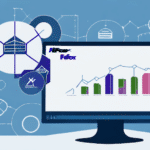Introduction to ERP Software and Its Importance for Businesses
Enterprise Resource Planning (ERP) software is integral to modern businesses, enabling the integration of various departments such as finance, operations, and human resources into a unified system. This integration streamlines processes, enhances efficiency, and reduces operational costs. According to Gartner's 2022 report, the global ERP software market is projected to grow steadily, underscoring its critical role in business operations.
Moreover, ERP systems provide a centralized database accessible by authorized personnel anytime and anywhere, facilitating informed decision-making and ensuring compliance with regulatory requirements. By automating processes, ERP software minimizes the risk of errors and accelerates operations, helping businesses stay competitive in today’s fast-paced environment.
Overview of Microsoft Dynamics 365 Business Central and Epicor ERP
Microsoft Dynamics 365 Business Central
Microsoft Dynamics 365 Business Central is a cloud-based ERP solution designed for small to medium-sized businesses. It integrates finance, operations, sales, and customer service, offering a user-friendly interface and seamless integration with other Microsoft applications. Key features include:
- Financial Management
- Sales and Customer Service
- Project Management
- Inventory Management
Additional capabilities include advanced supply chain management, demand forecasting, and warehouse management, which help optimize inventory levels and enhance overall efficiency. The platform is highly customizable with a range of add-ons and extensions available through the Microsoft AppSource marketplace.
Epicor ERP
Epicor ERP offers a comprehensive solution tailored for industries such as manufacturing, distribution, and retail. It provides robust functionalities including:
- Supply Chain Management
- Production Management
- Financial Management
- Customer Relationship Management (CRM)
- Human Resource Management (HRM)
Epicor ERP enhances operational efficiency and visibility, offering advanced analytics and reporting tools that enable data-driven decision-making. It integrates seamlessly with other systems such as Salesforce, Magento, and DocuSign, creating a cohesive workflow across different platforms.
Key Comparisons Between Microsoft Dynamics 365 Business Central and Epicor ERP
Features and Benefits
Both ERP solutions offer a wide range of features, but they cater to different business needs. Business Central is ideal for businesses seeking seamless integration with Microsoft products and a user-friendly interface, while Epicor ERP is suited for companies requiring more advanced customization and industry-specific functionalities.
Pricing Models
Microsoft Dynamics 365 Business Central utilizes a subscription-based pricing model, making it cost-effective for small to medium-sized businesses. Epicor ERP offers both subscription-based and perpetual licensing models, providing flexibility for businesses with different budgetary preferences.
Scalability and Flexibility
Both solutions are highly scalable. Business Central’s cloud-based nature offers greater flexibility and accessibility, whereas Epicor ERP can be deployed on-premises or in the cloud, catering to diverse business requirements. Business Central integrates seamlessly with Microsoft Office 365 and Power BI, fostering streamlined workflows, while Epicor ERP allows for extensive customization to meet complex business needs.
Implementation Timeframes
Implementation timeframes vary between the two. Business Central, being cloud-based, typically has a shorter implementation period, often taking a few weeks. Epicor ERP, with its extensive customization options, may require several months for full deployment, especially for larger enterprises with complex processes.
Customization Options
Both ERP systems offer customization, but the approach differs. Business Central provides a wide range of add-ons through Microsoft AppSource, allowing for user-friendly customizations without extensive technical knowledge. Epicor ERP offers more advanced customization capabilities, which can be advantageous for businesses with unique and complex requirements but may require higher technical expertise and costs.
Integration Capabilities
Integration is a key strength for both ERP solutions. Business Central seamlessly integrates with Microsoft applications such as Office 365 and Power BI, as well as numerous third-party applications available on AppSource. Epicor ERP integrates with systems like Salesforce, Magento, and DocuSign, enabling businesses to create a cohesive workflow across different platforms.
Reporting and Analytics Features
Both ERPs offer robust reporting and analytics tools. Business Central leverages Power BI for real-time data analysis and visualization, providing insightful dashboards and reports. Epicor ERP includes Epicor Data Analytics, offering advanced analytics capabilities that allow businesses to gain deep insights into their operations and make informed, data-driven decisions.
Real-World Case Studies
Numerous businesses have benefited from implementing Microsoft Dynamics 365 Business Central and Epicor ERP. For example, Vickers Engineering, a leading manufacturer, utilized Business Central to enhance operational efficiency and productivity by integrating their financial and inventory management systems. On the other hand, Werner Electric, a wholesale distributor, implemented Epicor ERP to streamline their supply chain operations and reduce overhead costs, resulting in significant improvements in service delivery and customer satisfaction.
Conclusion: Choosing the Right ERP for Your Business
Both Microsoft Dynamics 365 Business Central and Epicor ERP are powerful ERP solutions offering extensive features, customization options, and scalability. The optimal choice depends on your business’s specific needs:
- Microsoft Dynamics 365 Business Central is ideal for small to medium-sized businesses looking for seamless Microsoft integration, user-friendly interfaces, and lower upfront costs.
- Epicor ERP is better suited for larger enterprises requiring advanced customization, industry-specific functionalities, and flexible deployment options.
Ultimately, both systems provide comprehensive tools to enhance efficiency, streamline operations, and offer valuable insights, empowering businesses to achieve their strategic objectives.






















